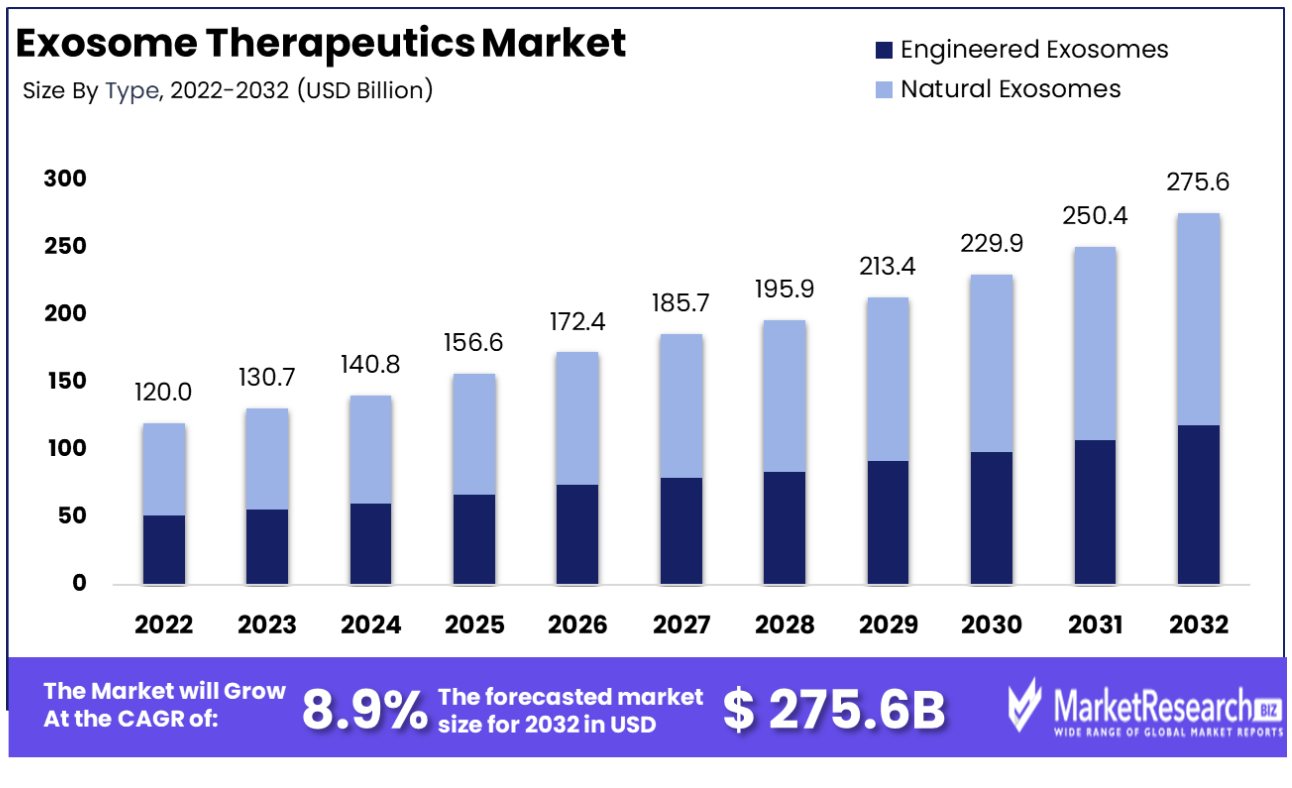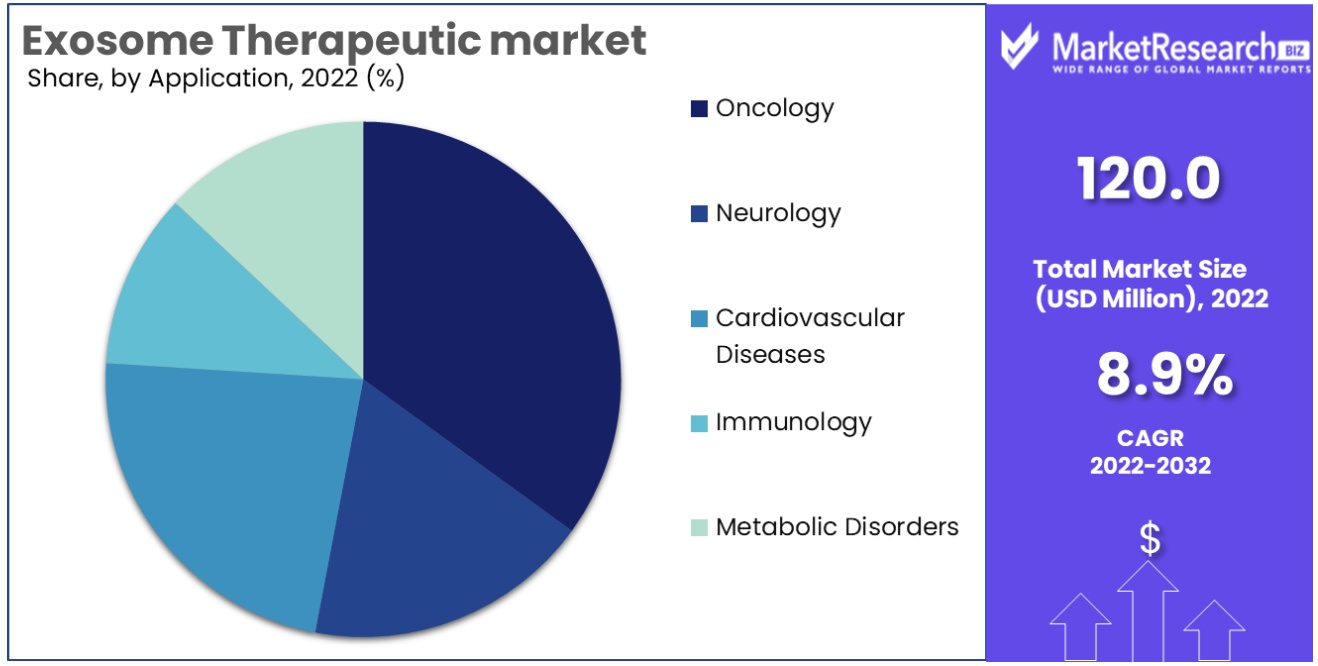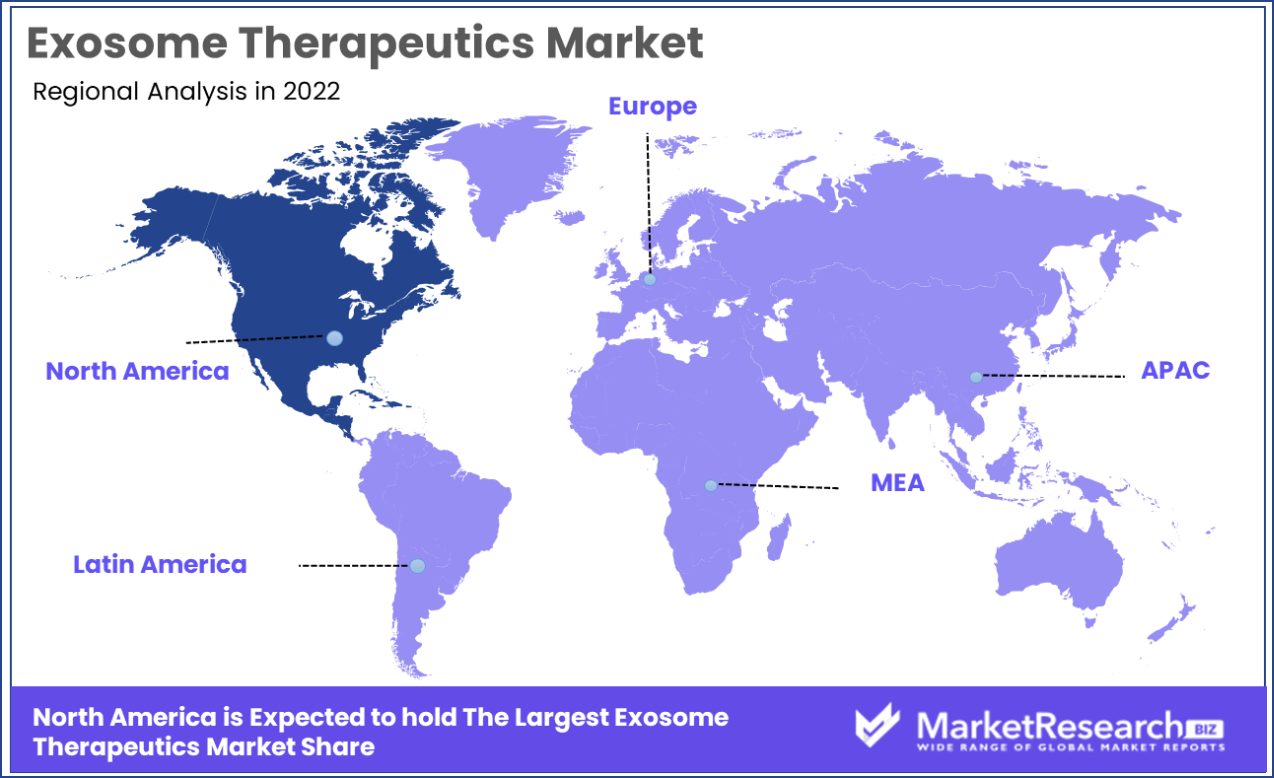
Exosome Therapeutics Market By Type(Engineered Exosomes, Natural Exosomes), By Source(Mesenchymal Stem Cells, Immune Cells, , Endothelial Cells, Other), By Application(Oncology, , Cardiovascular Diseases), By Therapy(Immunotherapy, Chemotherapy, Gene Therapy), By Region And Companies - Industry Segment Outlook, Market Assessment, Competition Scenario, Trends, And Forecast 2023-2032
-
37756
-
June 2023
-
180
-
-
This report was compiled by Correspondence Linkedin | Detailed Market research Methodology Our methodology involves a mix of primary research, including interviews with leading mental health experts, and secondary research from reputable medical journals and databases. View Detailed Methodology Page
-
The Exosome Therapeutic market was valued at USD 120 million in 2022. It is expected to reach USD 140.89 million by 2032, with a CAGR of 8.9% during the forecast period from 2023 to 2032.

Exosome therapeutics market growth is being propelled by cancer prevalence rates and demand for less-invasive diagnostic methods, among other factors. Exosomes help control tumor growth, metastasis, and angiogenesis processes in cancer formation while acting as predictive markers for future tumor patients.
According to the American Cancer Society in 2023, about 1,958,310 new cancer cases have been discovered and among that there are 609,820 cancer death cases have been registered. This number is anticipated to surge over the next two decades globally. As the cancer cases are rising, it is said that the demand for exosomes in handling the cancer would be certainly high, which leads to the market expansion of exosome therapeutics.
Exosomes come from cow’s milk, which is thereby used to supply therapeutic molecules against lung Cancer and breast cancer. Exosomes are extracted from specific parts of the body for anticancer vaccines due to their improved passive targeting and ability to cross biological hurdles.
Additionally, exosomes are derived from immune cells that can be combined together to improve the body’s immune response against cancer. This specific target and customized approach provides less off-target impact and enhances the efficiency of cancer therapeutics. As exosome biology advances, the development of exosome-based treatments will be improvised in order to fight against cancer, providing a strategic method for both treatment and diagnosis in the field of oncology.
In the pharmaceutical sector, exosomes play a vital role in multiple applications in drug discovery, development, and delivery. It has been employed in the drug market to build many effective medications. These exosomes improve the ability to cure many deadly and perilous diseases. Exosomes act as natural carriers of bioactive molecules, helping to understand disease advancement and the identification of drug targets.
These exosomes are specifically engineered to provide therapeutic agents by creating them a promising candidate for a special targeted drug delivery system. The pharma industry is discovering exosomes for the development of new therapies that include cancer and neurodegenerative disorders. The instant exosomes which are freeze-dried exosomes are used for research applications.
Such type of research and demand for advanced exosomes will likely open new business opportunities for more efficacy and customized therapeutic innovations which will lead to exosomes therapeutic market expansion in the coming years.
Driving Factors
Increasing Prevalence of Chronic Diseases Spurs Exosome Therapeutics Market
Exosome therapeutics market growth has been propelled by chronic diseases' rise worldwide. Cancer, cardiovascular illness, and neurodegenerative disorders all pose substantial health challenges that must be met worldwide; exosomes have proven valuable tools in diagnosing and treating them due to their role in cell-to-cell communication and molecular transport.
As the prevalence of chronic diseases continues to climb, so too has demand for innovative approaches such as exosome therapies - specifically targeting pathological processes involved in chronic illnesses - surged. This trend should spur substantial investment into exosome therapeutic development efforts with specific targets in mind.
Accelerating Exosome Therapeutics Advancements
Research and development activities related to exosome therapeutics are driving market expansion. Since exosomes are relatively novel as an area of study, considerable efforts are going into understanding their biology, therapeutic potential, delivery mechanisms, and application methods - this research is essential in unlocking their therapeutic applications ranging from drug delivery systems to biomarkers for disease.
Investment in research and development by academic institutions, pharmaceutical companies, and biotech firms points to an expanding pipeline of potential exosome-based therapies. Ongoing research may produce innovative therapeutic solutions that may further drive market expansion while leading to breakthroughs in treating various diseases.
Pharma and Biotech Expansions Boost Exosome Therapeutics
Exosome therapeutics markets have experienced substantial growth with the expansion of pharmaceutical and biotechnology sectors as a major driving force. As these sectors expand, their growth brings the increased capacity for research, development, and commercialization of novel therapies such as exosome-based treatments - this trend is supported by rising healthcare spending as well as investments into biotech innovations.
As pharmaceutical and biotech industries advance, their focus will likely expand upon cutting-edge technologies like exosome therapeutics. This expansion not only strengthens development capabilities for these therapies but also ensures an environment conducive to progressing them from research to clinical application.
Restraining Factors
High Production Cost Restrains Exosome Therapeutics Market Growth
Exosome therapeutics' high production costs significantly hinder market expansion. Isolating, characterizing and modifying exosomes for therapeutic use is a complex and resource-intensive process; often requiring advanced technology and skilled personnel as well as stringent manufacturing environments to guarantee product quality and safety. This leads to higher costs associated with developing and producing these treatments - an obstacle that limits their affordability or accessibility in markets with limited healthcare funding or smaller biotech firms.
Limited Clinical Data Restrains Exosome Therapeutics Market Growth
The lack of extensive clinical data on the efficacy and safety of exosome therapeutics limits their market growth. As a relatively new field in medicine, exosome therapy is still undergoing various phases of clinical trials. Limited data on long-term effects, optimal dosing, and potential side effects can lead to uncertainty and skepticism among healthcare providers and patients. This lack of comprehensive clinical evidence can hinder regulatory approvals and the widespread adoption of exosome therapies in clinical settings. Ongoing and robust clinical research is essential to establish the therapeutic potential of exosomes and to expand their market presence.
Exosome Therapeutics Market Segment Analysis
By Type
Engineered exosomes are currently the market leader for exosome therapeutics due to their customizable nature and specific targeting capabilities, which allow for easy diagnosis. Engineered exosomes can also be customized with therapeutic payloads such as RNA, proteins, or drugs directly targeted towards affected cells or tissues while their ability to bypass immune defense systems and inherent biocompatibility makes them highly effective as drug delivery vehicles. Their versatility in treating various diseases including cancer and neurological conditions also propels their market success.
Natural exosomes play an essential role, yet their applications are limited when compared with engineered ones. While natural ones can be useful in regenerative medicine and diagnostics applications, engineered ones offer customizable features.
By Source
MSCs are an invaluable source of therapeutic exosomes. Exosomes from MSCs have demonstrated potential in several therapeutic areas, such as tissue regeneration, immunomodulation, and anti-inflammatory treatments. Their ability to promote healing while modulating immune response makes them especially valuable in regenerative medicine and immunological disorders.
Exosomes derived from other sources, including immune and cancer cells, are being researched for potential roles in immunotherapy and oncology treatments. Exosomes produced by endothelial and neuronal cells could prove useful in cardiovascular and neurodegenerative disease therapies.
By Application
Oncology is one of the primary applications for exosome therapeutics. Exosomes have proven useful in cancer treatments through drug delivery, immunotherapy, and biomarker detection/monitoring. Their ability to selectively target cancer cells and alter tumor microenvironments plays a key role in cancer therapeutic progress.
Neurology sees the use of exosomes in addressing neurodegenerative diseases, while in cardiovascular diseases, they are used for tissue regeneration and repair. application of exosomes in immunology and metabolic disorders due to their modulatory effects on various bodily processes.

By Therapy
Immunotherapy is one of the main focuses of exosome therapeutics for oncology patients. Exosome-based immunotherapies involve manipulating immune system responses to recognize and attack cancer cells more effectively while simultaneously minimizing side effects. Studies conducted using this approach have proven promising in increasing efficacy while minimizing side effects during cancer treatments.
Exosomes are being explored as vehicles for targeted chemotherapy, aiming to reduce the systemic toxicity associated with traditional chemotherapy. Gene therapy using exosomes is an emerging field, with potential applications in various genetic disorders.
By Type
- Engineered Exosomes
- Natural Exosomes
By Source
- Mesenchymal Stem Cells (MSCs)
- Immune Cells
- Cancer Cells
- Endothelial Cells
- Neuronal Cells
- Other
By Application
- Oncology
- Neurology
- Cardiovascular Diseases
- Immunology
- Metabolic Disorders
- Other
By Therapy
- Immunotherapy
- Chemotherapy
- Gene Therapy
Growth Opportunities
Increasing Use of Multifunctional Property of Exosome Therapy Enhances Market Prospects
Exosome therapy's market growth can be attributed to its multifunctionality. Exosomes act as messengers between cells and can transport proteins, lipids, and nucleic acids for therapeutic applications; making them highly versatile therapeutic agents used to treat various forms of disease including cancer, neurodegenerative disorders, and inflammatory conditions. Their ability to target specific cells while carrying therapeutic agents enhances personalized medicine applications which will drive demand further for exosome therapy and increase market potential.
Continuous Technological Advancements Propel Exosome Therapeutics Market
Ongoing technological advancements in the field of exosome research and therapy are crucial for the market's expansion. Innovations in isolation techniques, characterization, and scalability of production are enhancing the efficacy and accessibility of exosome therapies. Improved technology also allows for more precise targeting and delivery of therapeutic agents via exosomes. As these technologies continue to evolve, they enable the development of more effective and safe exosome-based treatments, which is likely to accelerate market growth and broaden the range of treatable conditions.
Increasing Prevalence of Chronic Diseases Catalyzes Exosome Therapeutics Market Development
The rising prevalence of chronic diseases worldwide is one of the key drivers behind exosome therapeutics market growth. Chronic conditions like cancer, cardiovascular diseases, and diabetes have unmet medical needs where exosome therapy could provide novel treatment avenues. With increased rates of disease worldwide necessitating targeted and effective solutions like exosome therapy; their demand is expected to skyrocket presenting tremendous opportunities for growth for this market segment.
Regional Analysis
North America Leads in the Exosome Therapeutics Market
North America is a predominant player in the exosome therapeutics market, attributed to its advanced biotechnology sector, significant investments in medical research, and a strong focus on innovative therapeutic solutions. Key Trend factors contributing to this market dominance include robust healthcare infrastructure, substantial government and private funding in biotech and pharmaceutical research, and the presence of leading universities and research institutions that drive advancements in exosome Isolation science.
Market dynamics in North America are further influenced by an aggressive approach toward the development of novel therapeutics, including those for cancer and degenerative diseases, where exosome therapy shows promise. Additionally, the region's stringent regulatory environment ensures high standards in research and development, further bolstering the market's growth.
Forecast implications suggest that North America will continue to be a frontrunner in the exosome therapeutics market. The increasing prevalence of chronic diseases, coupled with ongoing technological advancements and the growing emphasis on personalized medicine, are expected to fuel further innovations and market growth in this field.

Europe:
Europe holds an outstanding position in the exosome therapeutics market, driven by its exceptional research capabilities, long-established healthcare systems, and investments in regenerative medicine and biotechnologies. Furthermore, Europe boasts an excellent collaborative research environment between academic institutions, biotech firms, pharmaceutical entities, and others that benefits market growth.
The European market is anticipated to experience steady growth, propelled by ongoing research advancements, rising healthcare expenditure, and growing interest in innovative therapeutic approaches, including exosome-based treatments.
Asia-Pacific:
The Asia-Pacific region is an emerging market in the field of exosome therapeutics. Factors such as increasing healthcare spending, the growing biotech industry, and rising interest in advanced therapeutic methods contribute to this growth. Countries like China, Japan, and South Korea are investing in biotechnology research, including exosome therapy.
The future market in Asia-Pacific looks promising, with potential growth driven by advancements in medical research, increasing collaboration between regional and international biotech companies, and a growing emphasis on innovative treatments for chronic diseases. The market's expansion is also likely to be supported by the region's increasing patient population and rising healthcare needs.
Exosome Therapeutics market Key Regions and Countries
North America
- The US
- Canada
- Rest of North America
Europe
- Germany
- France
- The UK
- Spain
- Italy
- Russia
- Netherlands
- Rest of Europe
Asia-Pacific
- China
- Japan
- South Korea
- India
- New Zealand
- Singapore
- Thailand
- Vietnam
- Rest of Asia Pacific
Latin America
- Brazil
- Mexico
- Rest of Latin America
Middle East & Africa
- South Africa
- Saudi Arabia
- UAE
- Rest of Middle East & Africa
Key Player Overview: Exosome Therapeutics Market
In the rapidly emerging exosome therapeutics market, a blend of innovative biotech firms is shaping the industry’s trajectory with groundbreaking research and strategic collaborations. Codiak BioSciences and Evox Therapeutics are at the forefront, recognized for their pioneering work in exosome engineering and drug delivery systems. Their strategic positioning emphasizes advanced therapies for a range of diseases, setting a benchmark in exosome therapeutics.
Capricor Therapeutics and ReNeuron Group have carved out significant niches with their focus on regenerative medicine and neurodegenerative diseases, respectively. Their contributions are vital in exploring the therapeutic potential of exosomes in complex medical conditions.
Cargosense Therapeutics and Anjarium Biosciences are emerging as key players with their innovative approaches to cargo-loading technologies for exosomes, enhancing the precision and efficacy of exosome-based treatments.
Avalon GloboCare and System Biosciences contribute to the market with their expertise in exosome isolation and characterization, crucial for the development and standardization of exosome therapies. HansaBioMed Life Sciences and Aethlon Medical, Inc. are recognized for their specialized focus on exosome diagnostic and therapeutic applications, furthering the industry's understanding of exosome biology.
These key players collectively drive the exosome therapeutics market through a combination of pioneering research, strategic partnerships, and a focus on developing novel therapeutics and diagnostic tools based on exosome technology, paving the way for next-generation medical treatments.
Top Key Players in Exosome Therapeutics Market
- Codiak BioSciences
- Evox Therapeutics
- Capricor Therapeutics
- ReNeuron Group
- Cargosense Therapeutics
- Exosome Diagnostics Inc.
- Anjarium Biosciences
- Avalon GloboCare
- System Biosciences
- HansaBioMed Life Sciences
- Aethlon Medical, Inc.
- Other
Recent Development
- In 2023, Vesigen Therapeutics, Inc. presented new data at the Exosome-Based Therapeutic Development Summit 5th Annual Meeting in Boston. The presentation highlighted their proprietary ARMM (ARrestin-domain 1 Mediated Microvesicles) delivery technology. They discussed therapeutic in vivo gene editing in a preclinical model of acute liver injury and summarized biodistribution translation evidence across species, including non-human primates.
- In August 2023, HK inno. N announced that it had signed a Contract Manufacturing Agreement (CMO) with Brexogen, a company specializing in exosome therapeutics. This agreement aimed to produce cell lines for exosome therapeutics derived from stem cells.
- August 2023, Evox Therapeutics, a UK-based company, entered into a research collaboration and option agreement with the Icahn School of Medicine at Mount Sinai, New York, to develop exosome-encapsulated adeno-associated virus AAV (exoAAV) vectors for heart disease treatments. This collaboration aims to utilize exosomes to deliver gene therapies to cardiomyocytes, focusing on heart disease treatments.
- In July 2022, Cells for Cells (C4C), a clinical-stage biotech specializing in allogeneic stem cell and stem-cells-derived therapeutics for chronic diseases, announced a six-month follow-up of clinical data from the first patient treated with an exosome-produced therapy for osteoarthritis. The results were presented by Maroun Khoury, the chief scientific officer at C4C.
Report Scope
Report Features Description Market Value (2022) USD 120 million Forecast Revenue (2032) USD 140.89 million CAGR (2023-2032) 8.9% Base Year for Estimation 2022 Historic Period 2016-2022 Forecast Period 2023-2032 Report Coverage Revenue Forecast, Market Dynamics, COVID-19 Impact, Competitive Landscape, Recent Developments Segments Covered By Type(Engineered Exosomes, Natural Exosomes), By Source(Mesenchymal Stem Cells (MSCs), Immune Cells, , Endothelial Cells, Other), By Application(Oncology, , Cardiovascular Diseases, Metabolic Disorders, Other), By Therapy(Immunotherapy, Chemotherapy, Gene Therapy) Regional Analysis North America - The US, Canada, Europe - Germany, France, The UK, Spain, Italy, Russia, Netherlands, Rest of Europe, Asia-Pacific - China, Japan, South Korea, India, New Zealand, Singapore, Thailand, Vietnam, Rest of Asia Pacific, Latin America - Brazil, Mexico, Rest of Latin America, Middle East & Africa - South Africa, Saudi Arabia, UAE, Rest of Middle East & Africa Competitive Landscape Codiak BioSciences, Evox Therapeutics, Capricor Therapeutics, ReNeuron Group, Exosome Diagnostics Inc., Avalon GloboCare, System Biosciences, HansaBioMed Life Sciences, Aethlon Medical, Inc., Other Customization Scope Customization for segments, region/country-level will be provided. Moreover, additional customization can be done based on the requirements. Purchase Options We have three licenses to opt for Single User License, Multi-User License (Up to 5 Users), Corporate Use License (Unlimited User and Printable PDF) -
-
- Codiak BioSciences
- Evox Therapeutics
- Capricor Therapeutics
- ReNeuron Group
- Cargosense Therapeutics
- Exosome Diagnostics Inc.
- Anjarium Biosciences
- Avalon GloboCare
- System Biosciences
- HansaBioMed Life Sciences
- Aethlon Medical, Inc.
- Other




